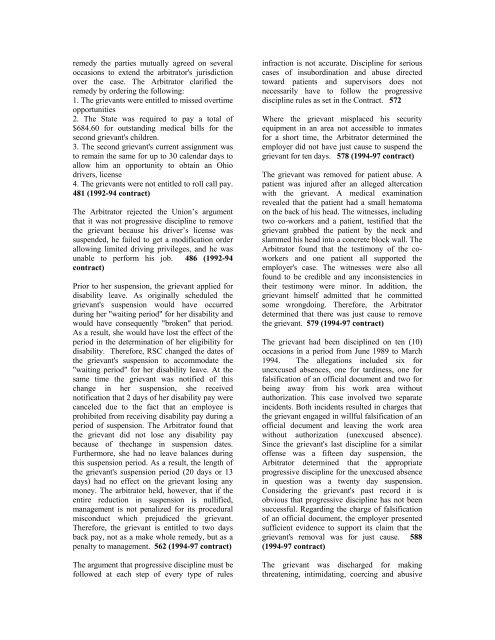by Contract Number (PDF) - OCSEA
by Contract Number (PDF) - OCSEA
by Contract Number (PDF) - OCSEA
Create successful ePaper yourself
Turn your PDF publications into a flip-book with our unique Google optimized e-Paper software.
emedy the parties mutually agreed on several<br />
occasions to extend the arbitrator's jurisdiction<br />
over the case. The Arbitrator clarified the<br />
remedy <strong>by</strong> ordering the following:<br />
1. The grievants were entitled to missed overtime<br />
opportunities<br />
2. The State was required to pay a total of<br />
$684.60 for outstanding medical bills for the<br />
second grievant's children.<br />
3. The second grievant's current assignment was<br />
to remain the same for up to 30 calendar days to<br />
allow him an opportunity to obtain an Ohio<br />
drivers, license<br />
4. The grievants were not entitled to roll call pay.<br />
481 (1992-94 contract)<br />
The Arbitrator rejected the Union’s argument<br />
that it was not progressive discipline to remove<br />
the grievant because his driver’s license was<br />
suspended, he failed to get a modification order<br />
allowing limited driving privileges, and he was<br />
unable to perform his job. 486 (1992-94<br />
contract)<br />
Prior to her suspension, the grievant applied for<br />
disability leave. As originally scheduled the<br />
grievant's suspension would have occurred<br />
during her "waiting period" for her disability and<br />
would have consequently "broken" that period.<br />
As a result, she would have lost the effect of the<br />
period in the determination of her eligibility for<br />
disability. Therefore, RSC changed the dates of<br />
the grievant's suspension to accommodate the<br />
"waiting period" for her disability leave. At the<br />
same time the grievant was notified of this<br />
change in her suspension, she received<br />
notification that 2 days of her disability pay were<br />
canceled due to the fact that an employee is<br />
prohibited from receiving disability pay during a<br />
period of suspension. The Arbitrator found that<br />
the grievant did not lose any disability pay<br />
because of thechange in suspension dates.<br />
Furthermore, she had no leave balances during<br />
this suspension period. As a result, the length of<br />
the grievant's suspension period (20 days or 13<br />
days) had no effect on the grievant losing any<br />
money. The arbitrator held, however, that if the<br />
entire reduction in suspension is nullified,<br />
management is not penalized for its procedural<br />
misconduct which prejudiced the grievant.<br />
Therefore, the grievant is entitled to two days<br />
back pay, not as a make whole remedy, but as a<br />
penalty to management. 562 (1994-97 contract)<br />
The argument that progressive discipline must be<br />
followed at each step of every type of rules<br />
infraction is not accurate. Discipline for serious<br />
cases of insubordination and abuse directed<br />
toward patients and supervisors does not<br />
necessarily have to follow the progressive<br />
discipline rules as set in the <strong>Contract</strong>. 572<br />
Where the grievant misplaced his security<br />
equipment in an area not accessible to inmates<br />
for a short time, the Arbitrator determined the<br />
employer did not have just cause to suspend the<br />
grievant for ten days. 578 (1994-97 contract)<br />
The grievant was removed for patient abuse. A<br />
patient was injured after an alleged altercation<br />
with the grievant. A medical examination<br />
revealed that the patient had a small hematoma<br />
on the back of his head. The witnesses, including<br />
two co-workers and a patient, testified that the<br />
grievant grabbed the patient <strong>by</strong> the neck and<br />
slammed his head into a concrete block wall. The<br />
Arbitrator found that the testimony of the coworkers<br />
and one patient all supported the<br />
employer's case. The witnesses were also all<br />
found to be credible and any inconsistencies in<br />
their testimony were minor. In addition, the<br />
grievant himself admitted that he committed<br />
some wrongdoing. Therefore, the Arbitrator<br />
determined that there was just cause to remove<br />
the grievant. 579 (1994-97 contract)<br />
The grievant had been disciplined on ten (10)<br />
occasions in a period from June 1989 to March<br />
1994. The allegations included six for<br />
unexcused absences, one for tardiness, one for<br />
falsification of an official document and two for<br />
being away from his work area without<br />
authorization. This case involved two separate<br />
incidents. Both incidents resulted in charges that<br />
the grievant engaged in willful falsification of an<br />
official document and leaving the work area<br />
without authorization (unexcused absence).<br />
Since the grievant's last discipline for a similar<br />
offense was a fifteen day suspension, the<br />
Arbitrator determined that the appropriate<br />
progressive discipline for the unexcused absence<br />
in question was a twenty day suspension.<br />
Considering the grievant's past record it is<br />
obvious that progressive discipline has not been<br />
successful. Regarding the charge of falsification<br />
of an official document, the employer presented<br />
sufficient evidence to support its claim that the<br />
grievant's removal was for just cause. 588<br />
(1994-97 contract)<br />
The grievant was discharged for making<br />
threatening, intimidating, coercing and abusive
















